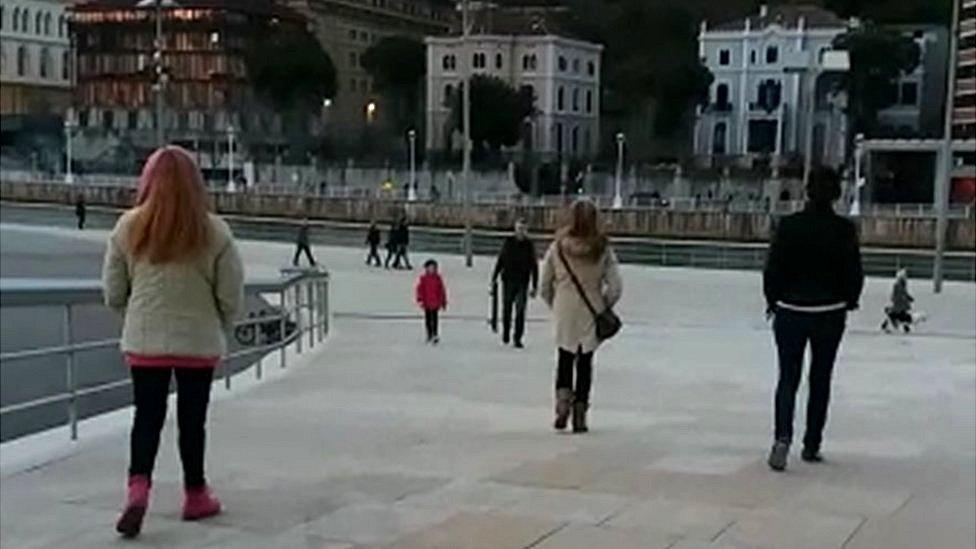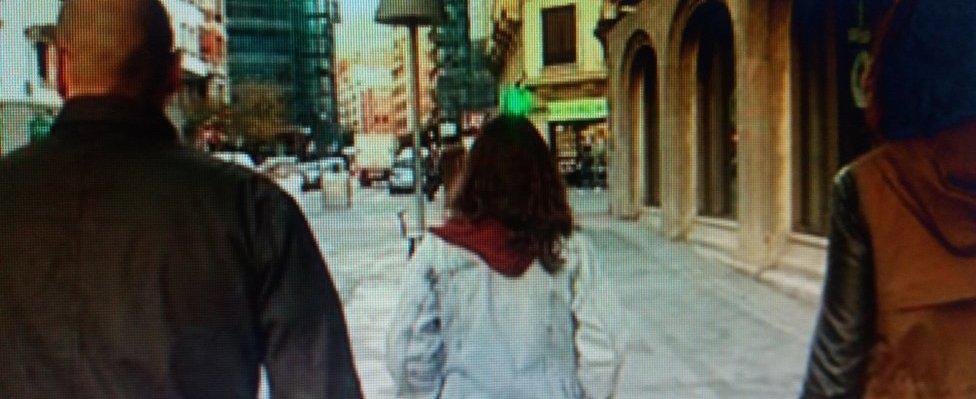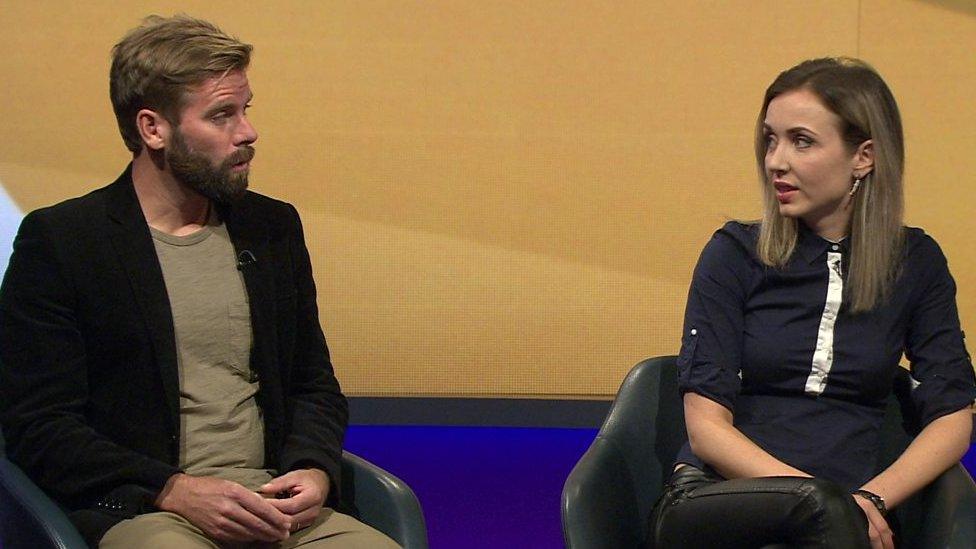Spain's female bodyguards who protect abused women
- Published

Two bodyguards keep a close eye on a victim of domestic violence in the centre of Bilbao
When Ana reported her male former partner for an assault at her home in Spain she thought she would be protected.
In fact she ended up living as a prisoner alone in her own house, afraid to go out in case she was confronted by her aggressor once more.
"I was living in terror. The only thing the police gave me was a special kind of telephone to call if he turned up. But I didn't feel safe."
Ana went online to contact women's support groups and was put in touch with Carolina, a former police bodyguard now using her skills and training to keep women safe from violent men.
Carolina had guarded public figures in the years before Basque separatist group Eta declared a halt to its bombing and assassination campaign in 2011.
She launched private association Edemm in response to cases just like Ana's. Women who had gone to the police but were left unprotected by the judicial system. Some were murdered by husbands or former partners.

Edemm describes itself as a Basque association for investigating men who mistreat women
The organisation offers 24-hour protection free of charge, helping vulnerable women to shake off the paralysing effects of fear and to face the world.
"We are talking to the Basque regional authorities and political parties. I want this to become standard, to be rolled out across the country and we are training more female bodyguards for this work," she explains.
Carolina lived with Ana for two weeks before the assault trial last year and remains on hand for moments when she needs company.

'She saved my life'
"I was wasting away and totally depressed," says Ana.
"I stayed in bed, I had stopped eating, lost 12 kilos and couldn't go out to work. Every time I heard a car outside, I felt panic. I did not go outside even to walk the dogs.
"She came and listened and said she was going to be with me. I wanted to hug her there and then but I thought it might not be ethical.
"I began to cook again, something simple like an omelette. She opened the windows and the blinds. She listened to me and I felt better every day. I could sleep properly again as I knew she was a professional bodyguard and I was protected."

How Ana's partner turned violent
A widow living on the outskirts of a village in Spain's Basque Country, Ana started what turned out to be a toxic relationship in early 2015. "Now I know he was a classic abuser," she says.
She describes being humiliated in front of her friends and psychological attacks that undermined her confidence. "He would say that it was my awful character that had killed my husband, and that I was ugly."
The psychological abuse became so bad at times that she called the police four times during the 18-month relationship. But she was told that she could only get help and protection if she formally reported her partner for an offence.
Eventually she ended the relationship in September 2016 when she caught him chatting with other women online. But, she says, he would not accept it.
"He kept calling, sending WhatsApp messages and SMS, some of which tried to be loving and others threatening, saying: 'I am coming to see you; you'd better be nice.' He used to spend hours outside my house, with me inside with the lights off and the blinds pulled down."
One night in mid-November, Ana relented and let her former partner in after he had been kicking at the door.
"He said he wanted to talk and would leave afterwards. I heard him out and said nothing had changed for me. I got him as far as the doorway and he struck me across the face with his hand."

Read more:
When she came to, Ana took the step of calling the police. But her problems got worse.
At a preliminary hearing the day after the assault she was given a seat close to her former partner who, she says, tried to intimidate her.
A social worker sent to visit her listened to her story and said they had both behaved like "a pair of 15-year-olds".

Most of Edemm's bodyguards are women but it also employs men
Ana reckons she has had to repeat her version of events six times to the various legal and judicial authorities before the trial found her abuser guilty only of "harassment", for which he was sentenced to 20 days of community service.
A six-month restraining order was imposed on him but Ana says it still has not been confirmed by the court bureaucracy and is therefore not effective.
"Luckily, I always have this woman I can call. Had I known her before, I wouldn't have spent so many nights stuck in my house while this man was prowling outside."
Spain's battle with gender violence
2004: Spain introduces new law in response to alarm over number of women murdered by partners and ex-partners; 72 women
Harsher sentences for men found guilty of domestic violence
Specific courts set up to handle cases faster and in a less threatening environment
Over a decade, 289,000 abusive partners were sentenced, 96% of whom were men.
But the number of women murdered by a partner remains stubbornly high
In 2004, 72 women died; the annual average since then stands at 61
All names in this article have been changed to protect identities.
Domestic violence: Useful contacts
In UK: Domestic violence helpline, external - 0808 2000 247
In Spain: 24-hour domestic violence helpline 016
email address: 016-online@msssi.es
24-hour helpline for mistreated women - (0034) 900 19 10 10
- Published15 March 2017
